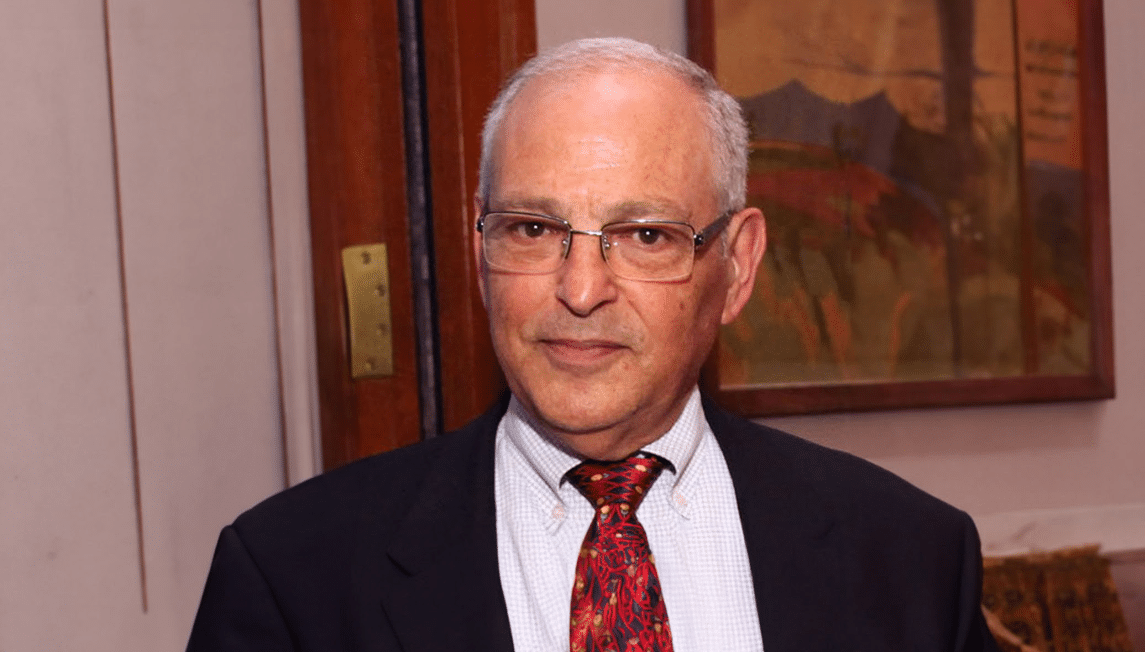“Bad,” said Novik, 77, who was a senior policy adviser to the late Israeli Prime Minister Shimon Peres. “I’d say that I don’t remember such a decisive moment. We are at a fork in the road, which can take us to untold troubles or potentially promise a new horizon. I’m afraid that we’re going to slide in the wrong direction and pay the price for it before we wake up to it.”
So Novik is no Pollyanna. But with war raging in Gaza, he is looking beyond the fighting for a pathway toward a diplomatic solution that could lead to two states, Israeli and Palestinian. It’s a decades-old vision that more than one politician, including Israeli Prime Minister Benjamin Netanyahu, has called dead on arrival.
In 2021, as a member of the executive committee of Commanders for Israel’s Security, Novik was part of a team of former security chiefs, military brass and top government advisers who wrote a defense of the two-state solution called “Initiative 2025.” The document said that even though such a solution seemed beyond the horizon, it remained the only way to ensure Israel’s security and future as a strong Jewish democracy.
Novik is sticking to those conclusions despite an Israeli government that is opposed to Palestinian statehood, and polling showing that just 35% of Israeli Jews support a two-state solution. The Biden administration is also pressing for an eventual two-state outcome, in a plan that could potentially include normalization between Israel and Saudi Arabia,
In our conversation, I wanted to know: Given the distrust, the bloodshed, the current mood of Israelis, the far-right policies of their government and the past failures of negotiations toward two states, how does any politician build a coalition and public support for anything less than an iron fist in Gaza and a tighter grip on the West Bank?
Novik, a fellow at the Israel Policy Forum, answered by describing the self-interests of Israel and its Arab neighbors, the frustrations of average Palestinians, a new role for the Palestinian Authority in Gaza and the grim alternatives for Israel if the two sides in the conflict are unable to separate.
[The Jewish Telegraphic Agency Report continues]
The Egyptians were astonished that they were willing to cooperate with a strategy whereby Hamas withdraws from governing the street and invites the Palestinian Authority to man the ministries of government and run the place. There was a whole roadmap for the gradual steps that would lead to the Palestinian Authority’s restored management of Gaza. We developed it jointly with the Egyptians and we were in contact with Saudis, Iraqis and even with the Trump administration in Washington. [Trump aide] Jared Kushner and [U.S. special envoy] Jason Greenblatt went to Cairo for a presentation of the plan and Greenblatt made a public announcement that it’s time for the Palestinian Authority to come back.
What did the Israeli government think of the plan?
Benjamin Netanyahu had given a green light to the discussion but had a change of heart and was sabotaging the plan. And the plan was just discarded and became a footnote to history. But it’s the exact same plan that is now being constructed by the administration in Washington, only under, on the one hand, more favorable conditions, and, on the other, more complicated.
What are the favorable conditions?
There is a very powerful Arab coalition that is more willing to engage in this endeavor. The Arab coalition is willing to engage in Gaza rehabilitation and serve as the crutches while the Palestinian Authority is in such a miserable state, and help the P.A. gradually come back and run the Gaza Strip, fund the rehabilitation and reconstruction and even put boots on the ground to replace the IDF until the Palestinian Authority can train and equip new units.
Why are they more amenable to that now?
They too were awakened to a wrong premise: that one can pay lip service to the Israeli-Palestinian conflict and live happily ever after. Oct. 7 demonstrated to them that their strategic interests, security, and internal stability are affected by violence in the Israeli-Palestinian arena. So Saudi Arabia, which used to be quite passive, are now willing to engage in diplomacy, managing Gaza and revitalizing the Palestinian Authority. They were all so tired of the P.A. until Oct. 6. Now they realize that being tired is not an action plan.
Another myth was that you can leapfrog over the Palestinians into the arms of the Arabs around the region like in the Abraham Accords.
[The Jewish Telegraphic Agency Report continues]
The unthinkable brutality on Oct. 7 did not produce an urge for it, but stay tuned. In all studies that I’ve seen, Israelis are saying — which is perhaps surprising — that force alone will not give us stability. In order not to give up security we need a combination of strength and diplomacy. In Israel, the term “political arrangements” is the new substitute for “peace agreement,” which lost all legitimacy for now. People wish to see a combination of diplomacy and strength which gives an alternative leadership a lot to work with, should they wish to.
Is that alternative leadership on the horizon? Because after events like these, you would think people would get more frightened, more right-wing, less open to, you know, political arrangements.
It’s too early to draw definitive conclusions but what we saw over the last four months is not necessarily how it really will evolve. When I look at the last four months, we are in phase three of the collapse of public support for the current leadership. Phase one was the nine months preceding Oct. 7 when 65 percent of the public opposed the government’s [judicial overhaul] initiative. Phase two was obviously Oct.7. itself, when the most common characterization was “abandonment” — abandonment by the army, and abandonment by the government. And the third phase was post-Oct. 7, when the government was missing in action, and it fell on civil society to deal with the needs of those affected, including the relatives of those who were kidnapped or killed or those who were evacuated from the south and from the north.
The visible result of those three phases is the collapse of the current coalition in the polls. The current coalition mustered a 64-seat majority in the [120-seat] Knesset. Now it’s about 44-45 [in polls], while the opposition is way over 70. I’m not suggesting that if elections were held tomorrow these would have been the results, but I think that the current coalition is done.
And the fact is that the most extreme right has not gained a single vote since Oct. 7, with all the anger and fear and despite an unprecedented rise in hate for Arabs, Palestinians and Israeli-citizen Arabs.
I am thinking of the American Jew who felt the two-state solution was inevitable but now feels listen, if you risk turning any of these territories over to Palestinian leadership, you are just inviting another Oct. 7. Why would separation make Israel safer over the alternative, which is military domination over both territories?
[The Jewish Telegraphic Agency Report continues]
So in my judgment, separation is inevitable.
Your colleague at the Israel Policy Forum, Michael Koplow, has written that if the United States and the Europeans recognize a Palestinian state without first working out the details it “will backfire with Israelis, will backfire with Palestinians, and will make a two-state outcome more rather than less remote.”
If recognition of a Palestinian state comes out of context, it will make people in Washington and elsewhere feel good about themselves. But it would do nothing for Palestinians, because in general they are done with gestures. And the reason that the younger generation, which doesn’t carry the scars of the Second Intifada like their parents, advocate violent resistance rather than political resistance, is because the younger generation doesn’t believe the situation will get any worse.
Meaning a credible path toward a two-state solution gives them something to lose, assuming they or their leadership are willing to accept less than the river to the sea.
In one situation, the terrorist is the hero of the neighborhood because he’s the only one who stands up to the occupation. In the other situation, the same terrorist in the same neighborhood risks what they have gained in independence. Will they help him get safe haven, or are they going to snitch on him in order not to lose?
Will the young Palestinian who can suddenly go abroad, can go to university, sees his life changing, sees his dignity restored — will he risk it because the extremists have a different vision?
I want to return to the security question — what assurances can you give an Israeli who says the risks of the inevitable future you see are worse than the current arrangement?
It’s a very serious question and I would answer it with the question Begin raised before he agreed to withdraw from the Sinai in order to have peace with Egypt: In the worst-case scenario, will we be able to rectify the situation at a reasonable cost? Are we going to be okay? And he was persuaded by the defense professionals that the answer is yes.
This same question has to be asked about Palestinian statehood. If worse comes to worst, if this Hamas or another Hamas wins elections in a post-peace Palestine and decides that it is not satisfied with less than everything, are we able to rectify the situation at a reasonable cost? We spent a year and a half with a huge team of all disciplines with thousands of years of experience around the table in developing security arrangements for that eventuality.
And again, always the bottom line is we don’t do it because we trust them. We do it because it serves our vision of Israel.
View this Jewish Telegraphic Agency Report from February 18th

